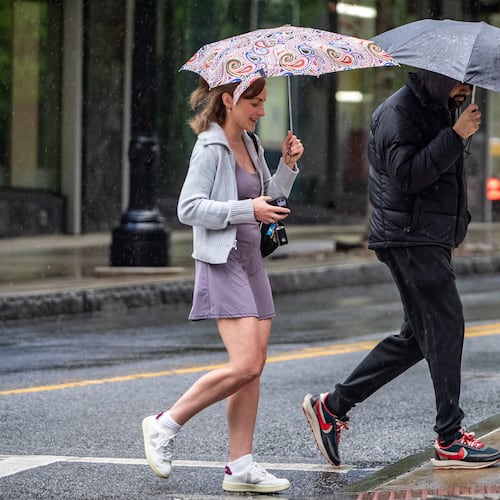Chiquita Carter’s job is a grueling one: she cooks, cleans, and cares for four adults with disabilities, over a non-stop, 40-hour stretch.
And yet, Carter’s face brightens when she goes to work at the group home in Tucker, as she deeply loves the people who live there. The 56-year-old no longer takes real breaks, and she’s learned how to pace herself during this marathon shift.
“I sleep with alert,” says Carter. “I’ve got one ear open and one ear closed.”
Her employer can’t find another worker to help with the weekend shift, because wages for these positions are low — so low that Carter has taken on two other jobs outside the group home, working nearly 100 hours a week to cover her bills.
Carter’s story points to a system in crisis. In Georgia and across the nation, workers who care for people with disabilities are leaving the industry in pursuit of higher-paying, less-stressful positions.
Credit: arvin.temkar@ajc.com
Credit: arvin.temkar@ajc.com
For the first time since 2015, the state of Georgia is examining the wages of these workers, otherwise known as direct support professionals or DSPs. They now make as little as $10.63 an hour in Georgia, and it’s not uncommon for DSPs to have multiple jobs.
Ashley Fielding, a spokesperson for the Georgia Department of Behavioral Health and Developmental Disabilities, said that this rate study will help to “rebuild the backbone of our system” and make sure that Georgians who need this care can access it for years to come.
“There are heroes in this state — working for DBHDD, the disability provider network and in hospitals or other acute care settings across the state — who are going to the ends of the earth on a daily basis to overcome the challenges caused by the shortage of direct service professionals and to ensure Georgians with disabilities get the care they need in the setting that’s right for them,” she said in a statement.
The worker exodus is fueling a breakdown of the system that is supposed to protect residents with severe disabilities. Organizations that serve Georgians with intellectual and developmental disabilities are now closing down, according to testimony from industry leaders at a recent state Legislative hearing. The group homes and day programs that have stayed open are operating with a skeleton staff.
Credit: arvin.temkar@ajc.com
Credit: arvin.temkar@ajc.com
“Everybody’s just kind of treading water. And the quality of services, despite people’s best efforts, is diminished,” said Diane Wilush, president and CEO of United Cerebral Palsy of Georgia and United Cerebral Palsy of South Carolina — an organization that oversees day programs and group homes in the state. “I’m embarrassed to say that the quality isn’t what it should be. But I also want to be honest about the fact that we’re not doing our best work.”
The state has contracted with an outside agency to study the wages for direct support professionals, and is expected to recommend an increase in the coming weeks. It’s unknown just how much of a pay boost these workers could get. It will take many months after a recommendation is made, and several other layers of approval, before workers could see a higher paycheck.
Wilush says this is the first time that the state has done a comprehensive study of these rates, and she expects implementing a wage increase could cost a hundred million dollars, at a minimum.
At the United Cerebral Palsy day program in Chamblee, there aren’t enough workers to properly care for the 40 people with disabilities, which include cerebral palsy, autism and other intellectual and developmental disabilities. In all, only 29 people are currently attending the program, and 11 people who are enrolled haven’t yet been able to come back.
Each DSP must support as many as seven people who need help with personal hygiene, eating and staying safe.
It’s a task that is overwhelming, and at times seemingly impossible.
The Georgia Department of Behavioral Health and Developmental Disabilities says that $10.63 is the recommended minimum to fund DSPs, meaning that places could pay their workers less, or more. The day program in Chamblee pays its workers a starting rate of $13 an hour, supplementing the $10.63 recommended minimum with other funds from the government, with more experienced workers making as much as $20 an hour.
Credit: arvin.temkar@ajc.com
Credit: arvin.temkar@ajc.com
It’s not enough to retain workers. Shenika Gibbs, day program manager, says that before the pandemic, they had 13 staff members working full time. Now, they only have six staffers, and need another seven.
“During COVID, we lost some staff,” Gibbs said. “After we came back from COVID, it was harder to get staff to come to work.”
The consequences are tangible: not only do staff struggle to care for the clients they have, but the day program has been forced to turn down new clients. In all, they’ve said no to about seven referrals in the last two months.
Carter, who juggles multiple jobs, says earning a more competitive wage would give her more stability in life.
“That way, I wouldn’t have to worry if my lights are getting cut off next week, if my gas is going to cut off next week or can I feed my baby,” she said.
At the group home in Tucker, Modupe Morrison clocks in for the evening shift. She’s come from her second job at a day program in DeKalb County, where she also works 40 hours a week.
A higher hourly wage could allow Morrison to work just one job. She has worked two jobs for years, so she can support her four daughters.
“This kind of job is not for everybody,” said Morrison, who is 55 years old. “I love working with this population. Because when I look at them, I look at them like my family.”
About the Author
Keep Reading
The Latest
Featured

